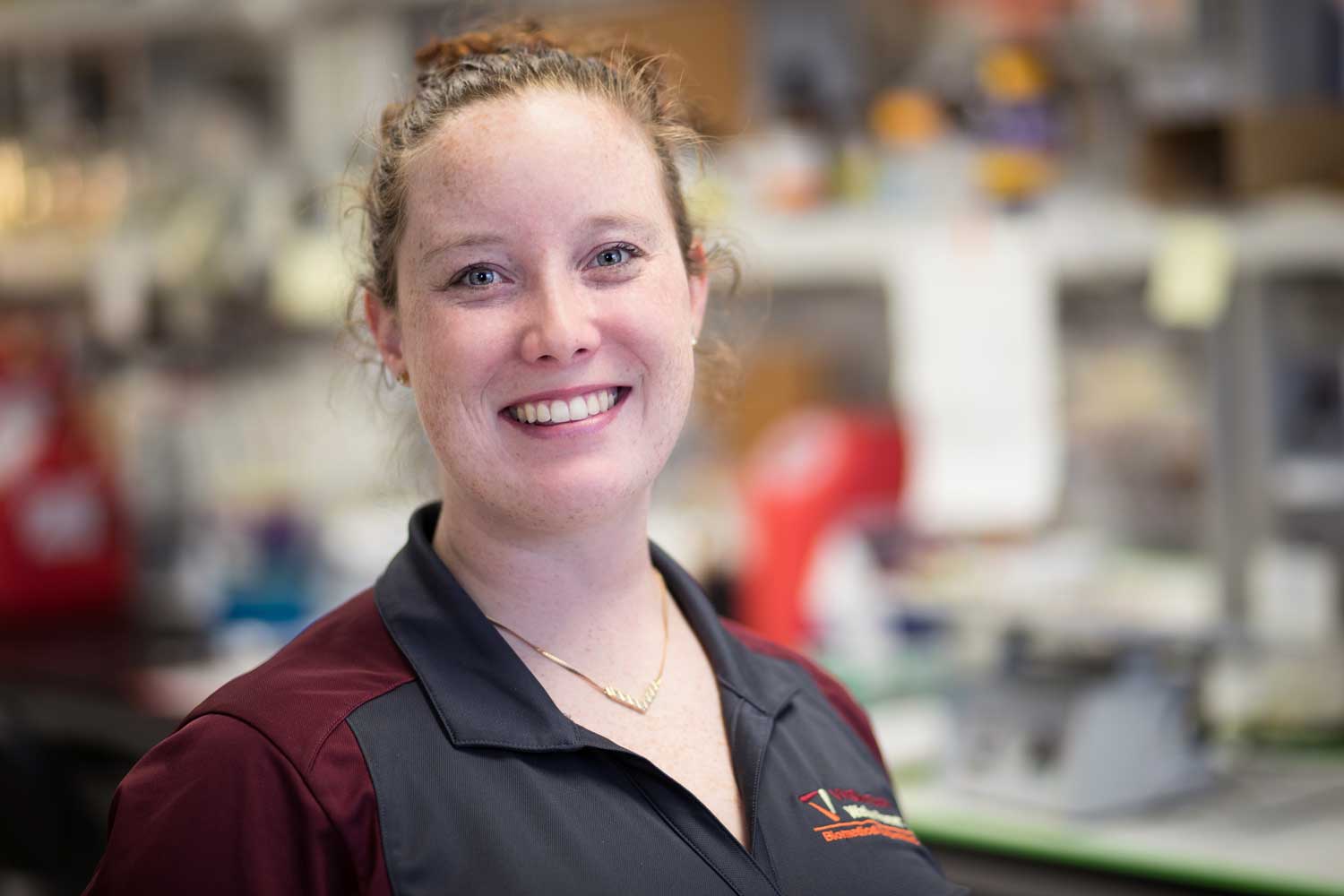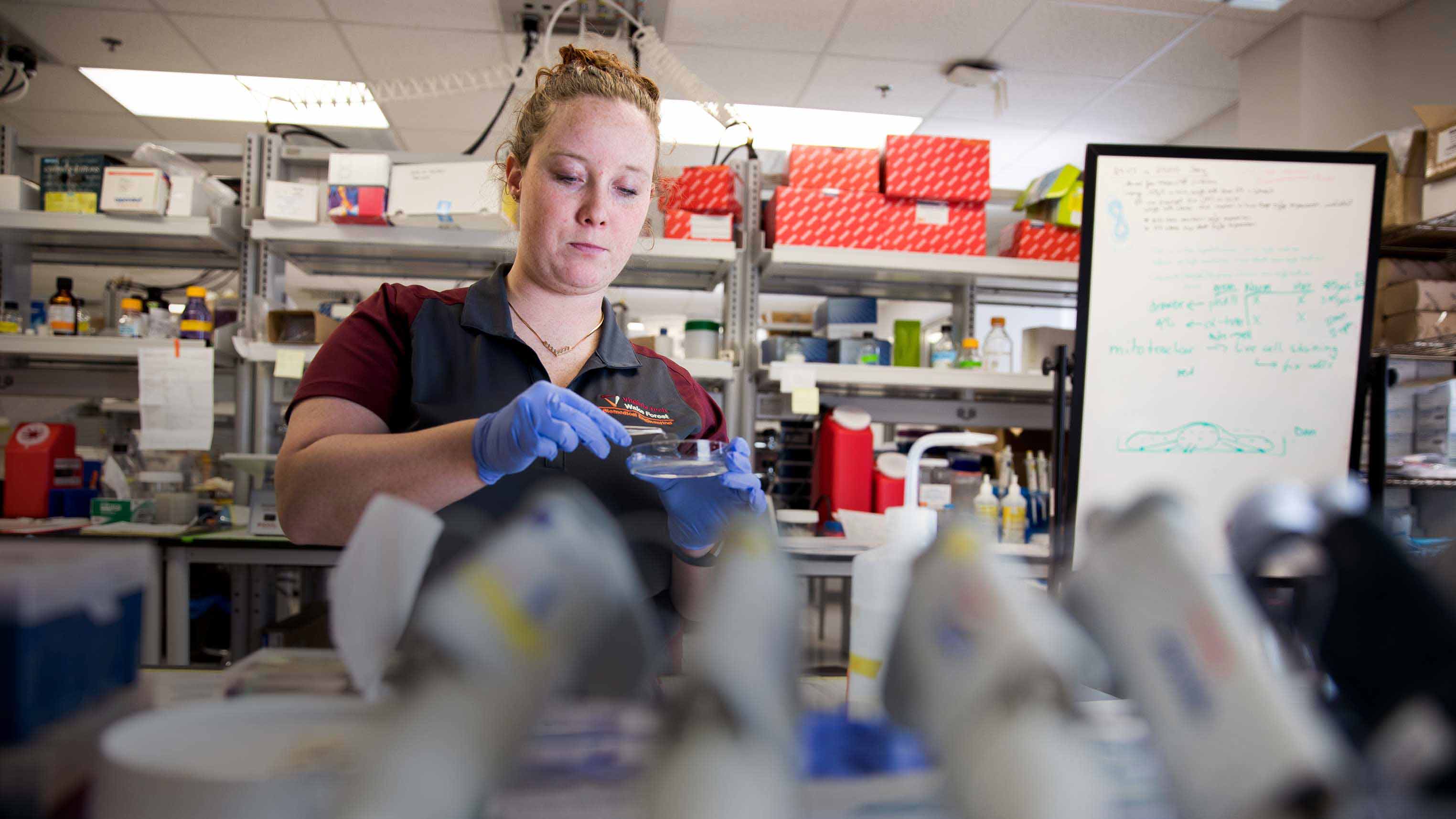The biomedical engineering student's Virginia Tech experience harks back to one of her beliefs about education: “You are here for a bigger purpose than a piece of paper.”
Alexandra Hyler, the 2018 Graduate Student of the Year, had two goals in addition to earning her Ph.D. at Virginia Tech: to stay sane and stay out of the bubble.
Hyler successfully defended her dissertation in biomedical engineering this spring and received her Ph.D. at the Graduate Commencement Ceremony in May. But on her way to earning that degree, she took on a number of leadership roles in a wide array of activities in pursuit of those other two objectives.
She currently is president of the Graduate Student Assembly, an organization for which she previously was director of programs and chair of the annual research symposium. She was president of the Virginia Tech chapter of the Biomedical Engineering Society and was co-chair of the graduate student committee for the university’s Women’s Alliance.
She also is active in the Interdisciplinary Research Honor Society, among other activities. And she finds time to mentor engineering students.
“I’ve always had the philosophy that if you only do work, you’ll go insane,” said Hyler, known as Alex. “For me, it was something that kept me sane. It took me out of the bubble and was a chance to give back to the university.”
Robin Queen, associate professor of biomedical engineering and mechanics, expressed admiration and amazement about Hyler’s extracurricular work. “I am not sure I can even name all of the things in which Alex is involved, but she manages to complete each task with extreme dedication; a passion for completing the work in an efficient, effective manner; and ensuring that she has the support of those around her,” said Queen.
Hyler said her Virginia Tech experiences also hark back to another of her beliefs about education: “You are here for a bigger purpose than a piece of paper.”

Hyler said she always has been interested in biological sciences and at one point considered a career in medicine. While attending high school in Lawrence, Kansas, she attended an outreach camp that had a biomedical engineering track. “I really liked the outreach camp experience,” she said.
She earned a degree in chemical engineering before beginning her graduate education journey at Virginia Tech. Her work focuses on women’s health, with an emphasis on ovarian cancer. After graduation, she will continue her research at CytoRecovery Inc., a company currently headquartered in the Virginia Tech Corporate Research Center.
Hyler said she loves engineering and its focus on teamwork to accomplish goals. That focus on teamwork and community extended to her extracurricular activities. “A lot of my success is because of how the team came together,” she noted.
Hyler said she had no idea what to expect when she began pursuing her Ph.D. at the Virginia Tech-Wake Forest University School of Biomedical Engineering and Sciencesin the College of Engineering. One of the most eye-opening aspects for her was getting comfortable with failure. “I had no idea how many things in research fail,” Hyler explained. “One of the most important experiences for me was learning to be OK with that. It’s important not to repeat mistakes, but failure is part of research.”
She said that recognition was part of her motivation to become a mentor and leader. “We’re not going through this alone. Everyone is failing. Everyone is having setbacks. You have a great network of people who share that experience.”
Connecting with other students outside the classroom and laboratory, and becoming involved with activities beyond degree requirements and research also help students learn about their peers’ experiences and stories and build a community and support network.
Hyler said she will leave Virginia Tech with more than a degree and her own story. “If you come and never get involved, you only tell one story,” said Hyler. “I can tell a million stories.”
Photos by Peter Means.
If you want to have an impact on our students and faculty like those featured in this magazine, go here to support the College of Engineering. For more information, call (540) 231-3628.
-
Article Item
-
Article Item
-
Article Item



